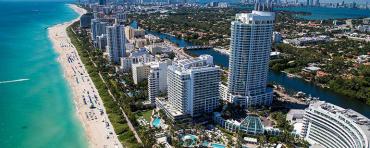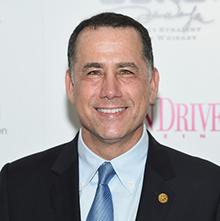
Miami Beach, it turns out, is a toxic city for any homeowner who wants to rent out his property during the months he isn't there. Twenty thousand dollars toxic, actually.
That’s the fine homeowners face if the city catches them renting illegally -- a fine which has skyrocketed from $500 in just a year. That amount doubles, then triples, and continues for repeat violators who rent out their property "illegally."
But homesharing companies like Airbnb say the city of Miami Beach has made the application to rent legally so difficult, it's nearly impossible to follow the law.
At the head of the issue? Miami Beach Mayor Philip Levine.
Since raising the penalty last March, the city of Miami Beach has fined residents and rental companies like Airbnb over $4 million and counting.
By way of definition, Airbnb serves as an intermediary, hooking up homeowners in vacation destinations with travelers -- most of them middle class -- who want to save money. They are the largest such service in the world.

Airbnb says Levine and the City of Miami Beach have done nothing but terrorize their business model, making the rental process nearly impossible and spreading a culture of fear among renters who are afraid of advocating for themselves lest they get whacked with a hefty fine.
All Levine's and the City Commission’s tactics, Airbnb says, are designed to make sure their industry fails.
“From the start, Miami Beach has been hostile,” Airbnb spokesman Ben Breit told Sunshine State News this week. “[Levine] is on the frontburner of the problems.”
Breit said Airbnb has never seen any other city slap renters with such high fines -- in New York, illegal renters face a $7,500 fine. Even Airbnb itself was rapped with a $100,000 fine last year.
“[Miami Beach’s] is the highest we have seen anywhere in the world,” Breit said.
Miami Beach’s mayor says those fines should be even larger.
“I think [the fines] can be increased, actually,” said Levine. “Twenty thousand dollars is not enough. Our community is not in favor of short-term rentals.”
The problems don’t stop there. In order to become a “legal” renter, homeowners must fill out a lengthy application laced with roadblocks, confusing language and fees.
After spending thousands of dollars and being sent around in circles to complete the application, many Miami Beach residents simply give up.
Airbnb isn’t the only industry that stands to lose out if the city of Miami Beach gets its way. The real estate market has also been struggling to keep its head above water since the city upped the fines. Realtors say their market, too, has suffered and international buyers are hesitant to fork over the cash for properties when they face immeasurable obstacles to renting out their properties short-term.
Miami property broker Ross Milroy told told Sunshine State News a vast majority of Miami Beach residents only live there part-time, so they are looking to make extra money to cover property taxes for the months they don’t live there.
But now, when buyers come to him to purchase a property, Milroy said not many hang around out once they’re warned about the high renting fine.
“They turn tail and run,” he said. “They fear limitations. I’ve had people come, look at a property with me and look away. They will go to another municipality [to buy.]”
Milroy also said property values have gone down because Airbnb has been bullied out of the city. The problem is, there are now too many houses to rent and not enough interested parties willing to haggle with the city over the rental fines.
Milroy questioned whether the crackdown on rentals is illegal -- but even if it is, he says, the push against Airbnb is fishy, especially in a town dominated by tourism -- and the hotel industry.
“It’s the hotel lobby,” he said. “They are all friends with the commission and Mayor Levine. They all run in the same circle. They all sat down and said, 'What can do to put the kabosh on Airbnb?' That’s what I think they did.”
The City Commission says they’re against homesharing companies like Airbnb because they “impose on their quality of life” due to irresponsible renters throwing parties and causing a commotion where they live full-time. Police will often pop into residents' homes, questioning whether they're renting out their property. Neighbors will often snitch on suspected illegal renters, creating a culture of fear in Miami Beach.
Despite the setbacks, guests pumped $253 million into the Miami Beach economy last year alone, spending $250 a day on restaurants, shopping and other commodities in the city. Airbnb contributed its share to the success of the city’s massive tourism industry.
Because of this, the company says fostering a positive relationship with the city is crucial to both parties. Airbnb says it has tried countless times for more than a year to contact Levine’s office and speak with city commissioners to pare down the fines, but all of their efforts have been fruitless because none of the commissioners, including Levine, will return their calls.
The phone rings and rings. No one picks up, Breit says.
Breit told SSN the only way Airbnb can really reach the city is by contacting media organizations to tell their story.
“The mayor and the commissioners refuse to talk to us,” Breit said. “Our hope is the mayor has bigger fish to fry than imposing punitive measures on their residents.”
The City Commission denied stonewalling Airbnb, but had no further details about their relationship at the time of this article’s release.
Milroy told SSN the short-term rental fines were creating a toxic culture in one of Florida’s hottest vacation cities.
“There are so many other ways [to make this work,] and five people are blatantly ignoring the rules and causing distress in their communities,” he said. “[Renters] are being very severely impacted by this. Seventy-five percent of the city are renters, how do you justify that? It’s very unfair.”
Reach reporter Allison Nielsen by email at allison@sunshinestatenews.com or follow her on Twitter: @AllisonNielsen.


